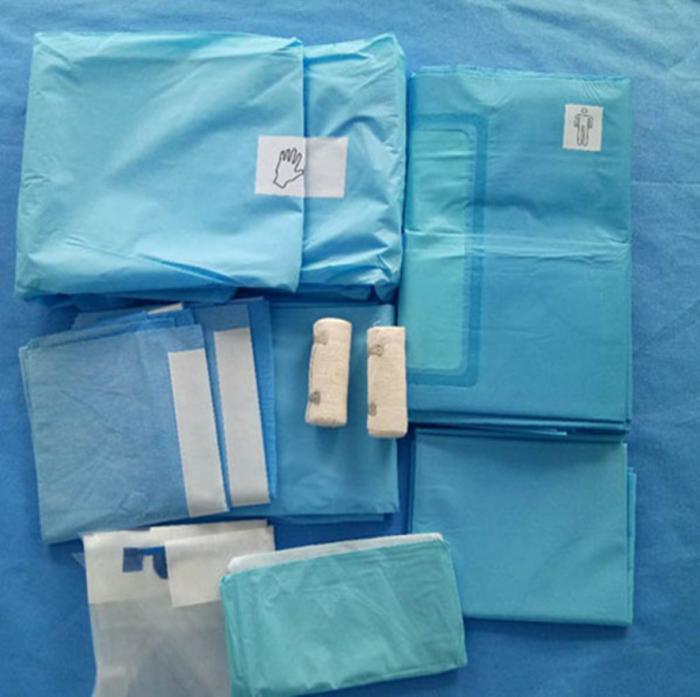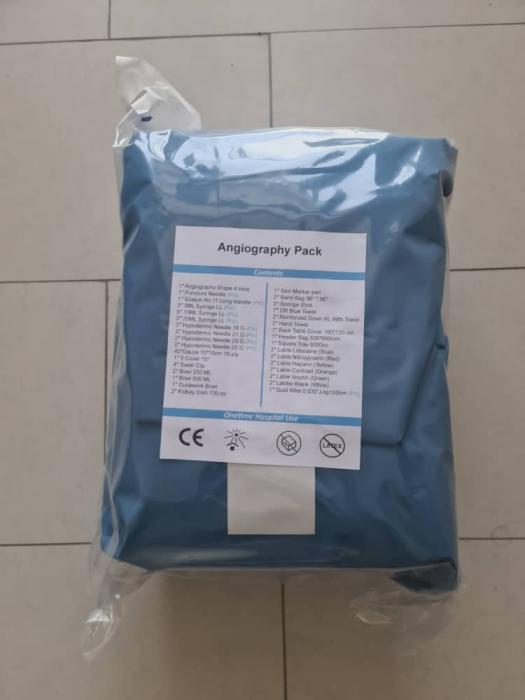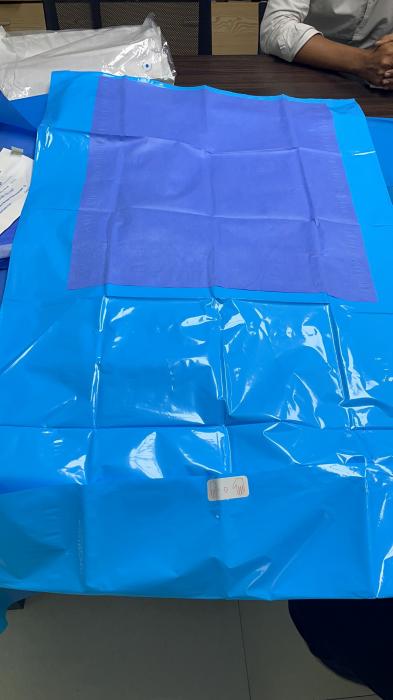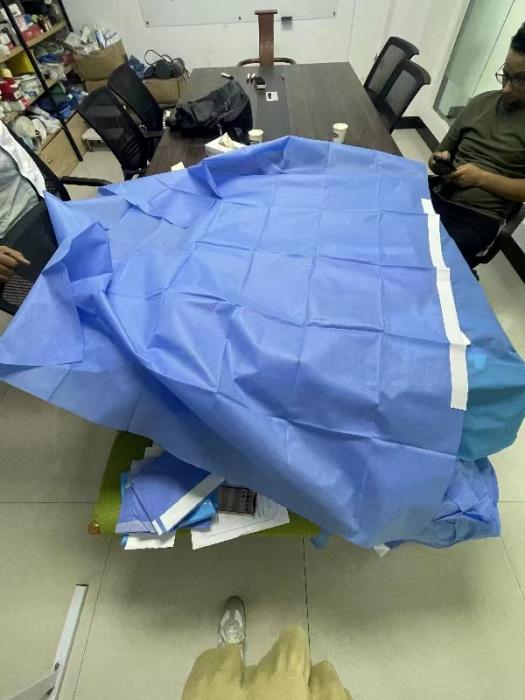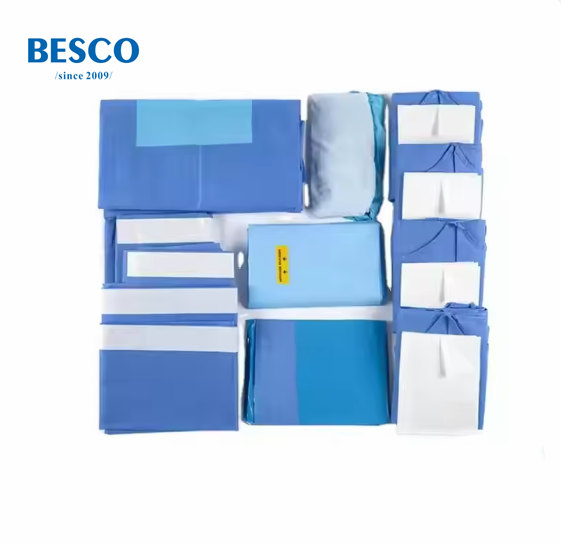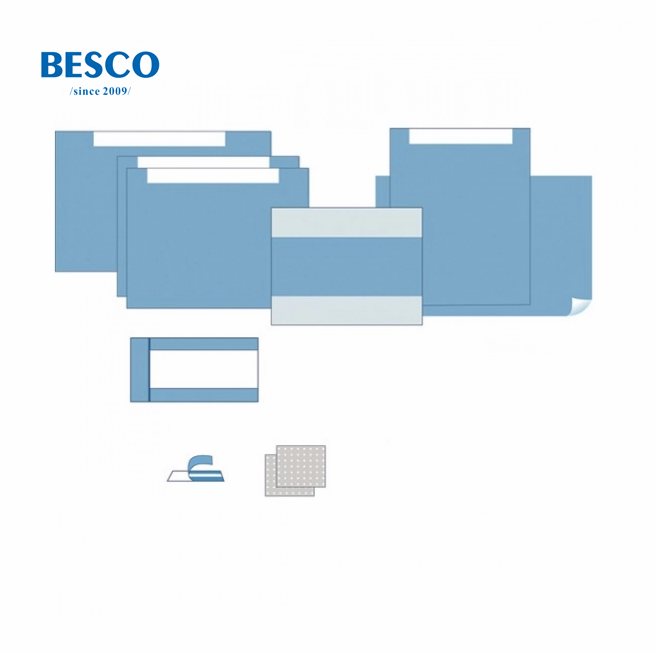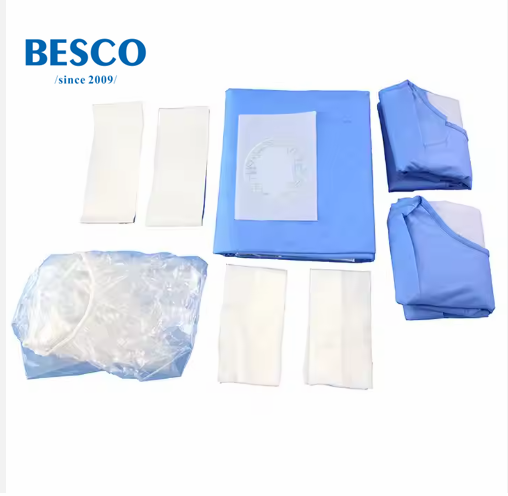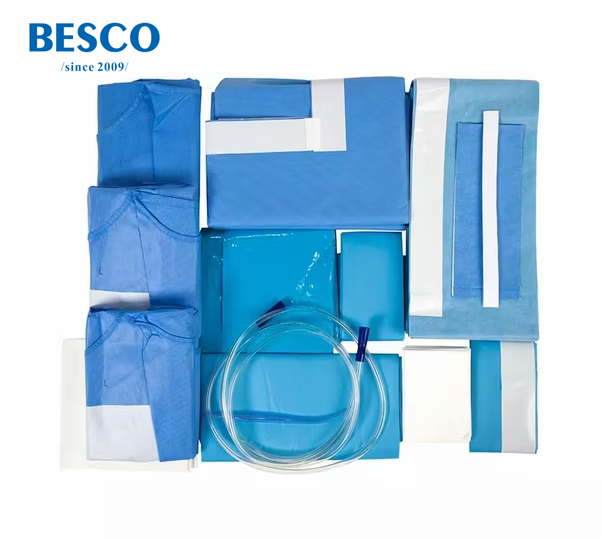| Name: | Disposable Surgical Packs |
|---|---|
| Model No.: | Disposable Surgical Packs |
| Material: | Non-woven SMS |
| Brand: | BESCO |
| Keywords: | Surgical Packs,Disposable Surgical Packs,Disposable Procedure Surgical Packs,Disposable Sterile Surgical Procedure Kits |
| LEAD TIME: | 5 days |
| MOQ: | 500 packs |
| Sample: | Available |
| Payment Term: | T/T in advance |
| Stock: | Available |
| Country of Original: | China |
| Port of Loading: | Qingdao |
| Factory Address: | Changyuan,China |
| Office: | Zhengzhou,China |
Products Description
Disposable surgical packs are popular because they improve patient safety by reducing contamination and surgical site infections, increase efficiency by providing pre-assembled, standardized kits, and offer cost-effectiveness by eliminating the expenses associated with cleaning and repairing reusable items. They also offer convenience by ensuring necessary sterile components are readily available, saving preparation time and streamlining workflows in the operating room.
Benefits of Disposable Surgical Packs
Enhanced Patient Safety:
Pre-packaged sterile components in disposable packs minimize the risk of contamination and the spread of infection compared to reusable items.
Improved Efficiency:
Packs are pre-assembled, which reduces the time needed for preparation and ensures that all necessary tools and materials are available at the sterile field.
Cost Savings:
While seemingly adding costs, disposables eliminate expenses related to washing, sterilizing, maintaining, and repairing reusable items, which can lead to significant overall savings.
Standardization:
Every pack offers consistent quality and content, which helps maintain high surgical standards and streamlines the overall surgical workflow.
Convenience:
Medical staff have immediate access to all required components for a specific procedure, freeing up more time for patient care.
Reduced Waste (of resources):
By bundling items, disposable packs can help reduce waste in the sense of lost, broken, or unused items, and by eliminating the need for extensive packaging and unpacking of individual components.
Why Disposable Surgical Packs Are Preferred
Elimination of Cross-Contamination:
Disposable items, such as drapes and gowns, provide a reliable barrier against the spread of pathogens and eliminate the risk of cross-contamination that can occur with reusable items.
Streamlined Logistics:
The use of pre-packaged, single-use kits simplifies inventory management and eliminates the complex processes of controlling, maintaining, and repairing reusable surgical supplies.
Focus on Core Competencies:
Disposable packs allow surgical staff to focus on their primary roles and patient care, rather than on the logistical challenges of managing reusable surgical supplies.
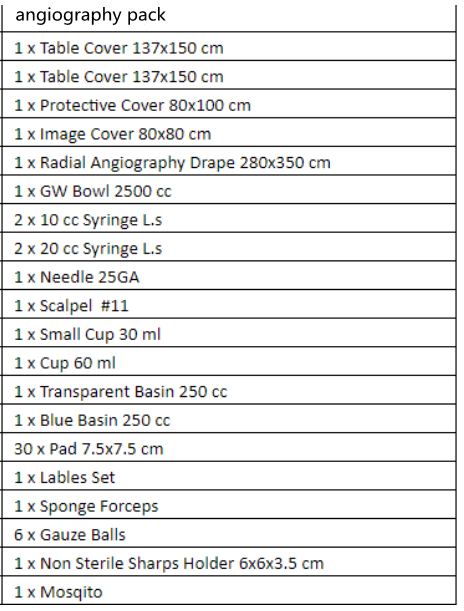
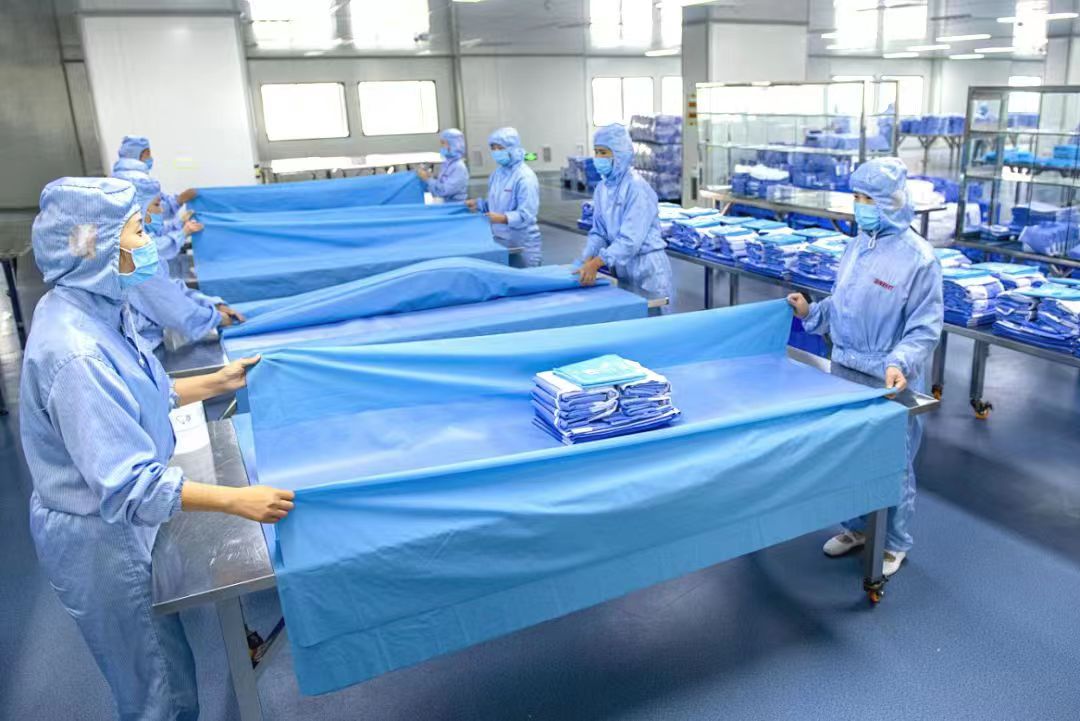

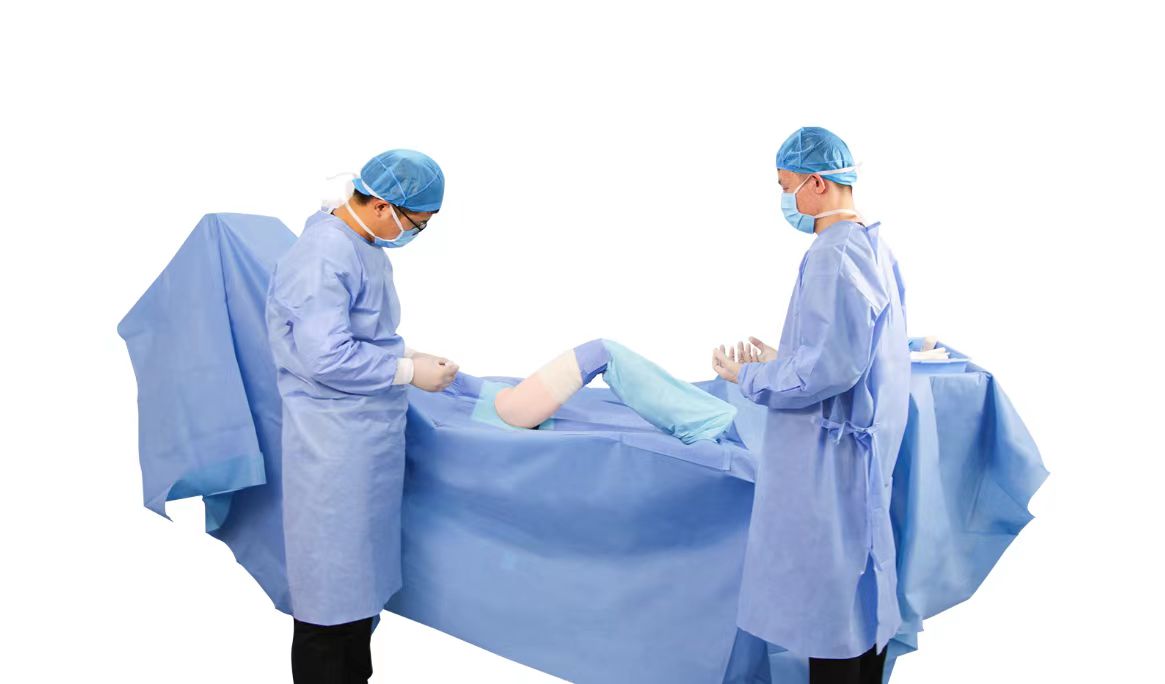
A disposable surgical pack is a pre-sterilized, single-use kit containing the necessary instruments and supplies for a specific surgical procedure.
Components
The exact contents of a disposable surgical pack will vary depending on the type of surgery it's designed for, but generally include items such as:
Surgical drapes
Surgical gowns
Surgical gloves
Gauze
Sponges
Other specialized instruments and supplies specific to the procedure
Purpose and benefits
Maintains sterility: Disposable packs reduce the risk of cross-contamination and infection by providing a clean, sterile environment for the surgical team and patient.
Enhances efficiency: Pre-packaged and sterilized packs streamline the preparation process, saving valuable time for medical staff and reducing operating room turnover time.
Cost-effective: While initial costs might be higher, the overall cost savings from eliminating sterilization equipment and labor, along with the convenience, often make disposable packs a cost-effective choice, especially for high-volume facilities.
Convenience: Disposable packs are ready to use and easy to discard after the procedure, simplifying workflow and minimizing cleanup.
Disadvantages
Environmental impact: The single-use nature of disposable packs generates a significant amount of medical waste, raising concerns about sustainability and environmental impact.
Higher cumulative costs: Over time, the repeated purchase of disposable packs can surpass the cost of reusable alternatives, especially for facilities with lower-volume procedures.
Limited customization: Unlike reusable devices, disposable packs may not always cater to highly specific needs or preferences of surgeons or complex procedures.
Supply chain dependency: Relying heavily on disposable supplies can make healthcare facilities vulnerable to supply chain disruptions during shortages or pandemics.
Disposable surgical packs are a crucial component of modern healthcare, balancing the critical need for sterility and efficiency in surgical procedures with considerations for cost and environmental impact.
The use of the surgical packs :
Surgical packs, also known as procedure packs, are pre-assembled kits containing all the necessary instruments and supplies for a specific surgical procedure. They streamline workflows by providing a standardized, organized, and efficient way to manage surgical tools, minimizing setup time and maximizing the focus on patient care.
Benefits of Using Surgical Packs:
Increased Efficiency:
By having all necessary items readily available in one pack, surgical teams can reduce preparation time and improve workflow in the operating room.
Reduced Turnover Time:
Surgical packs can significantly decrease the time between procedures, allowing for quicker patient turnaround and potentially increased surgical volume.
Cost Savings:
Standardized packs can lead to volume purchasing and potential cost reductions through bulk buying and reduced waste.
Improved Organization:
Surgical packs provide a structured approach to instrument and supply management, minimizing the risk of missing items or misplaced equipment.
Enhanced Safety:
By standardizing processes and ensuring consistent availability of necessary items, surgical packs can contribute to a safer surgical environment.
Reduced Errors:
The pre-assembled nature of surgical packs can minimize the risk of human error during the setup process, potentially leading to fewer complications.
Waste Reduction:
Custom packs can be tailored to specific procedures, reducing the likelihood of using excessive supplies and minimizing waste.
Key Components of Surgical Packs:
Instruments: Surgical instruments specific to the procedure, such as scalpels, forceps, retractors, and clamps.
Gauze and Sponges: Sterile materials for cleaning, absorbing fluids, and packing wounds.
Drapes: Sterile cloths used to create a sterile field around the surgical site.
Other Supplies: Depending on the procedure, packs may also include sutures, needles, medication, and other essential items.
Types of Surgical Packs:
Custom Packs:
Tailored to specific surgeons' preferences and individual procedures, providing maximum efficiency for a particular surgeon or procedure.
Standard Packs:
Pre-configured packs that are commonly used for common procedures, offering a balance of standardization and efficiency.
Single-use packs:
Disposable packs designed for one-time use, often preferred for certain procedures due to convenience and infection control considerations.
In veterinary medicine, surgical packs are also essential for:
Veterinary Surgical Packs: Used in animal surgeries, including spay/neuter procedures and other surgical interventions.
Important Considerations:
Proper Opening Techniques:
.
Maintaining sterility during the opening of surgical packs is crucial. Adhering to proper protocols and ensuring the integrity of the packaging is essential for patient safety.
Quality Control:
.
Regular checks of pack contents and packaging integrity are necessary to ensure that packs are free from defects or contamination.
Sterilization:
.
Surgical packs must undergo sterilization processes, such as autoclaving, to eliminate microorganisms and ensure sterility
